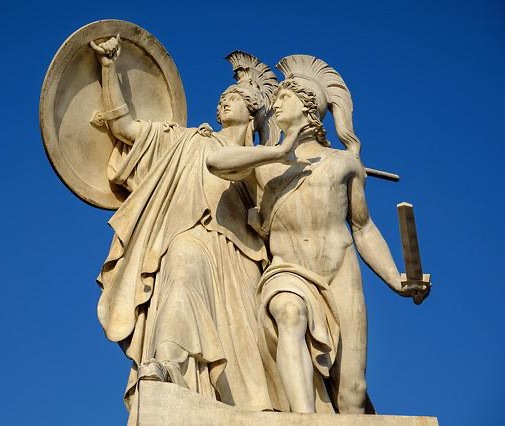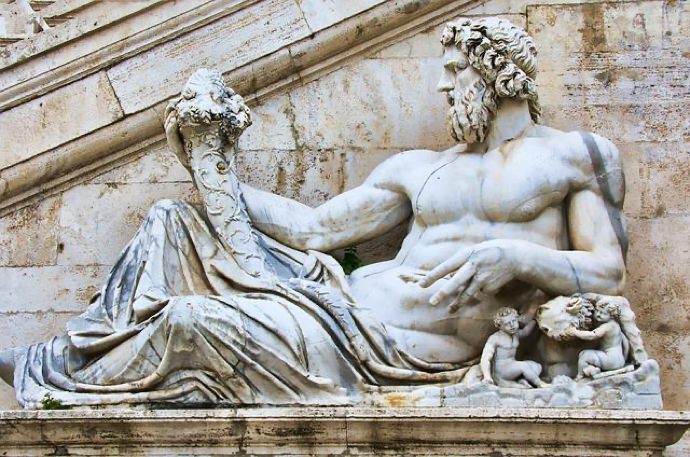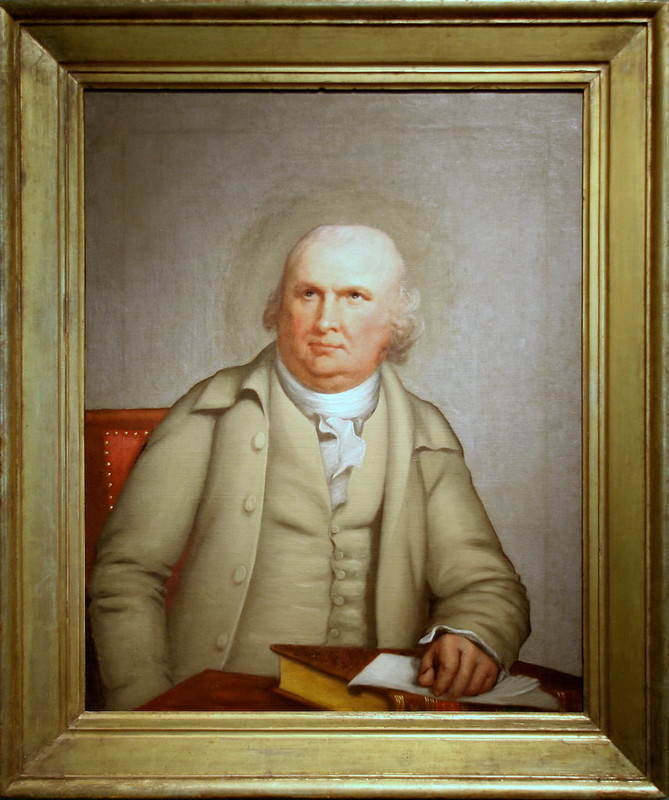History Of Bankruptcy — Debt Cancelation For The First 5,000 Years
Published Thursday, June 16th, 2022 by Attorney Dave Falvey - 1,789 views
I am developing an outline for a paper I intend to write on the History of Bankruptcy which is really ‘Debt Cancelation- A short paper on how Western Culture has dealt with debt.”
First, a ‘war story.’ A husband and wife came for a consultation about their debts. She was paying the bills and was worried and like most guys, he was paying no attention to the bills. After a review of the financials and analyzing the four major options in dealing with debt, I recommended Chapter 7 because it was the least expensive and fastest solution to resolve their financial difficulties. The husband who had been quite the whole time, finally spoke-up and said, “Young man, I understand everything you are saying, and it is very logical, but I have one basic problem. This is immoral and sinful what you are proposing because it is against God’s word.”
I recovered after hearing this and said, “Well, Pastor, I am not a Biblical scholar because I do not know much Greek to say the least and I do not know Hebrew. But let me bring-up the Internet. And with that I went to Deuteronomy Chapter 15. And I started to read it to him, and it went like this:
‘At the end of every seven years you must cancel debts. He shall not require payment from his fellow Israelite or brother, because the LORD’s time for canceling debts has been proclaimed. You may require payment from a foreigner, but you must cancel any debt your brother owes you…”
The Pastor said, ‘Oh, my word, I had forgotten about the Jubilee.’ See Leviticus 25-26:
The Sabbath Year
 25 The Lord said to Moses at Mount Sinai, 2 “Speak to the Israelites and say to them: ‘When you enter the land I am going to give you, the land itself must observe a sabbath to the Lord. 3 For six years sow your fields, and for six years prune your vineyards and gather their crops. 4 But in the seventh year the land is to have a year of sabbath rest, a sabbath to the Lord. Do not sow your fields or prune your vineyards. 5 Do not reap what grows of itself or harvest the grapes of your untended vines. The land is to have a year of rest. 6 Whatever the land yields during the sabbath year will be food for you—for yourself, your male and female servants, and the hired worker and temporary resident who live among you, 7 as well as for your livestock and the wild animals in your land. Whatever the land produces may be eaten.
25 The Lord said to Moses at Mount Sinai, 2 “Speak to the Israelites and say to them: ‘When you enter the land I am going to give you, the land itself must observe a sabbath to the Lord. 3 For six years sow your fields, and for six years prune your vineyards and gather their crops. 4 But in the seventh year the land is to have a year of sabbath rest, a sabbath to the Lord. Do not sow your fields or prune your vineyards. 5 Do not reap what grows of itself or harvest the grapes of your untended vines. The land is to have a year of rest. 6 Whatever the land yields during the sabbath year will be food for you—for yourself, your male and female servants, and the hired worker and temporary resident who live among you, 7 as well as for your livestock and the wild animals in your land. Whatever the land produces may be eaten.
The Year of Jubilee
8 “‘Count off seven sabbath years—seven times seven years—so that the seven sabbath years amount to a period of forty-nine years. 9 Then have the trumpet sounded everywhere on the tenth day of the seventh month; on the Day of Atonement sound the trumpet throughout your land. 10 Consecrate the fiftieth year and proclaim liberty throughout the land to all its inhabitants. It shall be a jubilee for you; each of you is to return to your family property and to your own clan. 11 The fiftieth year shall be a jubilee for you; do not sow and do not reap what grows of itself or harvest the untended vines. 12 For it is a jubilee and is to be holy for you; eat only what is taken directly from the fields.
13 “‘In this Year of Jubilee everyone is to return to their own property.
14 “‘If you sell land to any of your own people or buy land from them, do not take advantage of each other. 15 You are to buy from your own people on the basis of the number of years since the Jubilee. And they are to sell to you on the basis of the number of years left for harvesting crops. 16 When the years are many, you are to increase the price, and when the years are few, you are to decrease the price, because what is really being sold to you is the number of crops. 17 Do not take advantage of each other but fear your God. I am the Lord your God.
Is the Bible the only record of ‘debt cancelation’? Absolutely NOT!
See the Code of Hammurabi. “The many ancient documents deciphered from cuneiform script have enable historians to establish beyond any doubt that fur general cancellations took place during Hammurabi’s reign, in 1792, 1980, 1771, and 1762 BC’. Hammurabi proclaimed the official cancellation of citizens’ debts owed to the government, high-ranking officials, and dignitaries. The Hammurabi Code is thought to date back to 1762 BC its epilogue proclaims that “the powerful may not oppress the weak, the law must protect widows and orphans… in order to bring justice to the oppressed”.
Also, see: here.
Do I have any other references? Yes, let us look at the Rosetta Stone (not the software for learning languages). See here.
What we see as the Rosetta Stone was part of a stele. I want to quote from David Graeber’s very scholarly book entitled, DEBT:THE FIRST 5,000 YEARS, Page 219:
 ‘By the time of the New Kingdom (1550-1070), there is more evidence for markets, but it’s only by the time we reach the Iron Age, just before Egypt was absorbed into the Persian empire, that we begin to see evidence for Mesopotamian-style debt crises. Greek sources, for instance, record that the Pharaoh Bakenranef (reign 720-715 BC) issued a decree abolishing debt bondage and annulling all outstanding liabilities, since “he felt it would be absurd for a soldier, perhaps at the moment when he was setting forth to fight for his fatherland, to be hauled off to prison by his creditor for an upaid loan”-which, if true, is also one of the earliest mentions of a debt prison. Under the Ptolemies, the Greek dynasty that rule Egypt after Alexander, periodic clean slates had become institutionalized. It is well known that the Rosetta Stone, written in both Greek and Egyptian, proved to be the key that made it possible to translate Egyptian hieroglyphics. Few are aware of what it actually says. The stela was originally raised to announce an amnesty, both for debtors and for prisoners, declared by Ptolemy V in 196 BC.”
‘By the time of the New Kingdom (1550-1070), there is more evidence for markets, but it’s only by the time we reach the Iron Age, just before Egypt was absorbed into the Persian empire, that we begin to see evidence for Mesopotamian-style debt crises. Greek sources, for instance, record that the Pharaoh Bakenranef (reign 720-715 BC) issued a decree abolishing debt bondage and annulling all outstanding liabilities, since “he felt it would be absurd for a soldier, perhaps at the moment when he was setting forth to fight for his fatherland, to be hauled off to prison by his creditor for an upaid loan”-which, if true, is also one of the earliest mentions of a debt prison. Under the Ptolemies, the Greek dynasty that rule Egypt after Alexander, periodic clean slates had become institutionalized. It is well known that the Rosetta Stone, written in both Greek and Egyptian, proved to be the key that made it possible to translate Egyptian hieroglyphics. Few are aware of what it actually says. The stela was originally raised to announce an amnesty, both for debtors and for prisoners, declared by Ptolemy V in 196 BC.”
THE ROMANS: See The Twelve Tablets:
I quote: III. 1
“When a debt has been acknowledged or a judgment has been pronounced in court, 30 days must be the legitimate grace period. Thereafter, arrest of the debtor may be made by the laying on of hands. Bring him into court. If he does not satisfy the judgment (or no one in court offers himself as surety on his behalf) the creditor may take the debtor with him. He may bind him either in stocks or fetters, with a weight of no less than 15 lbs. (or more if he desires).” [After 60 days in custody, the case is returned to the court, and if the debt is not then paid, the debtor can be sold abroad as a slave, or put to death.]
 This was the Roman’s version of the FDCPA (Fair Debt Collection Practices Act) and many believe that this Roman Law was the origin for the expression ‘he got his pound of flesh’ even though we think of Shylock in the Merchant of Venice ,Shakespeare, as originating this express, but it was a term which was carried over from the Roman Empire.
This was the Roman’s version of the FDCPA (Fair Debt Collection Practices Act) and many believe that this Roman Law was the origin for the expression ‘he got his pound of flesh’ even though we think of Shylock in the Merchant of Venice ,Shakespeare, as originating this express, but it was a term which was carried over from the Roman Empire.
The Romans were really ‘right wing Republicans’ and there were no ‘liberals’ back in the day.
The Romans did not have debt cancellation, they made it simple and had ‘life cancellation’ but most researchers cannot find any evident that creditors actually killed debtors because they were practical. If they killed the debtor, they have no one to collect from. So, overwhelmingly, debtors were sold into slavery. I wonder what the Romans would have done it they had developed the science and technology for ‘organ transplants’? And if they sold someone’s organ and received more than the outstanding debt, and assuming if the person were still alive, would the debtor receive the difference. Or if the debtor died because they took his heart, and they received more money than the outstanding debt, would the debtor’s estate be entitled to the difference?
Most people forget that Charles Dickens’ father was in Debtors’ Prison, and he visited his father in prison. Back in the day the Alt Right Wing Republicans believed that if you were in prison because you could not pay your debts, the state had no obligation to feed you. So, if your relatives or friends did not bring you any food, “So sad, too bad, you died of ‘prisoners’ disease.’ This situation exists today in some South American prisons.
Dickens’ A Christmas Carol was a repudiation of laissez-faire capitalism in favor of Christianity which is really a humanistic movement of the debtor or financial slave class. Most people do not know that while Charles Dickens was alive and well in England, Karl Marx and Friedrich Engels was, also, alive, and well in England. Think about that for a moment.
The Wizard of Oz is an allegory of the Great Depression with the Scarecrow are the farmers disposed, the Tin Man are the factory workers, the cowardly lion is the political caste, the OZ is an ounce because that’s the abbreviation for an ounce in measurements and the issue of having silver instead of gold as the financial standard and thus giving a ‘stimulus to the working class’ see: William Jennings Bryant Cross of Gold Speech when he ran for President. The Wicked Witch of the East or West are the bankers of the East or West coasts, etc.
In the British colonies they had debtors’ prison and the Alt-right wing Republicans carried on the tradition that the state was not responsible to feed the debtor. Debtors’ Prison was abolished in Connecticut in 1842.

Credit: https://www.flickr.com/photos/nostri-imago/3418641927
Most Americans do not know of Robert Morris who pledged his ‘life, his fortune and sacred honor’ when he signed the Declaration of Independence. He was the wealthiest person in the American colonies, and he was the financier for the Continental Army. He lost his fortune and after the American Revolution found himself in a debtor’s prison. George Washington visited him in jail. And Congress passed legislation which got him out of debtor’s prison and awarded him a modest pension.
It’s not mentioned in the standard history book, that bankruptcy was used by creditors to strip you of all your assets. Your clothes, dishes, furniture, etc. That’s why today we have ‘exemptions’ of many personal items. The creditor would petition you into bankruptcy in order to super-powers over you. They could come into your house and strip and take everything away from you, namely, clothes, dishes, furniture, bedding, etc. Strip your house ‘naked’ and if they though you were hiding any assets in your house, could literally dig-up your basement in search of buried treasure. Chapter 7 is called a ‘Liquidation’ where all your debts have to be listed and placed on a ‘conveyor’ belt that drops all the debts into a ‘fire’ or are canceled. But then you have to list all your assets and those assets go onto the conveyer belt to be dropped into a ‘fire’ or ‘liquidated’ which means that they are sold and the proceeds go the creditors. But today there are the very important EXEMPTIONS which allow you to take the assets off from the conveyer belt because you can exempt them from liquidation and preserved those assets for yourself. The purpose of the American bankruptcy system is to give you a ‘fresh start’ and you need tools and assets in order to restart your financial life.
There are not many books about the history of the law of bankruptcy in the United States, but one book was written by a Harvard professor of law, Bruce Mann, who is Elizabeth Warren’s husband, and the title to the book is: “A Republic of Debtors- Bankruptcy in the Age of American Independence” . As you know Elizabeth Warren taught bankruptcy law and was appointed to a committee to review our Bankruptcy Law while she was a professor at Harvard.
The etymology of the word ‘bankruptcy’ is derived from the Italian ‘banca rotta’ meaning ‘broken bench’ or ‘broken bank’ and money lenders had a bench and if they went broke, their ‘bench would be broken’
Now the US Constitution has only one line about bankruptcy, namely ‘ Congress shall have to right to enact laws of bankruptcy’ . See Article 1, Section 8, Clause 4 “ ‘to establish a uniform Rule of Naturalization, and uniform Law on the subject of Bankruptcies throughout the United States’
Of course, England had laws of ‘bankruptcy’ and bankruptcy was a tool only for the creditor class which was used to collect debts and not to set people free from debt. There still remains the power of the creditors to petition someone into bankruptcy in order to collect a debt and this is called an ‘Involuntary Bankruptcy.’ Most bankruptcies today are ‘Voluntary Bankruptcies.’ In order to understand an Involuntary Bankruptcy, you could read the biography of Oscar Wilde, who lost a lawsuit against a Lord and the Lord had the right to demand payment for defending himself against the lawsuit for slander. Wilde could not pay this debt and the Lord Douglas a/k/a Marquess of Queensberry petitioned him into bankruptcy. (as an aside, our boxing rules are called ‘Marquees of Queensberry Rules for boxing, were rules endorsed by the ‘Marquees of Queensberry) The prison term was very physically hard on him, and he emerged from prison with poor health and died a few years after his release.
In Egyptian and Babylonian days, the King or Pharaoh of Egypt could announce the cancelation of debt. And the according to the Jewish religion, the Lord God demanded that debts be canceled every 7 years or every 50 years. Debt cancelation restarted their economies which had ground to a halt because ‘capitalism is a boom and bust’ cyclical economy and when you get stuck, you can press ‘control, alt, delete’ and restart the computer. And it seems as if many things in life have to have a ‘safety valve’ like boilers, etc. otherwise there is an explosion. In the 1890’s the economic conditions were so bad, a second Civil War was in the making and in order to calm the financial stress of people in 1894, America took a quantum leap and instead of waiting for the King or Pharaoh, or the Lord to cancel debts, they radically expanded the law of bankruptcy to be used by debtors and not just creditors and that’s where the concept of petitioning the court with ‘voluntary petitions of bankruptcy’ in order to be free from debt. Why?
 America was the New World and it was the radical belief that everyone is entitled to a ‘fresh start’ , a ‘new beginning’ in order to the FREE FROM DEBT. When America enacted a financial law to free citizens from debt, Europe was ‘stunned’ and angry because there were many creditors in England and Europe. But America said, ‘This is our country. And everyone is entitled to a ‘fresh start’. Well, America is at its core an ‘experiment’. And how has this experiment worked? Most economists will tell you that one of the main reasons America is successful and has a dynamic economy is because people are not afraid to take risks and can try and fail but they can get up and try again. See Walt Disney, Henry Ford, Milton Hershey, etc.
America was the New World and it was the radical belief that everyone is entitled to a ‘fresh start’ , a ‘new beginning’ in order to the FREE FROM DEBT. When America enacted a financial law to free citizens from debt, Europe was ‘stunned’ and angry because there were many creditors in England and Europe. But America said, ‘This is our country. And everyone is entitled to a ‘fresh start’. Well, America is at its core an ‘experiment’. And how has this experiment worked? Most economists will tell you that one of the main reasons America is successful and has a dynamic economy is because people are not afraid to take risks and can try and fail but they can get up and try again. See Walt Disney, Henry Ford, Milton Hershey, etc.
And, yes, America had slavery but we are evolving and slavery was abolished. And we have to recognize that the legal construct or basis for all slavery is ‘debt.’
Political slaves cannot vote and financial slaves can not get out of debt.
And we must remember that the 13th, 14th and 15th Amendments to our U.S. Constitution pertained to eliminating slavery and were enacted after the American Civil War or War Between the States during the era called ‘Reconstruction’. These amendments are called, ‘The Reconstruction Amendments’ and, also, the ‘Civil War Amendments’. I call them the ‘Freedom Amendments’.
The 13th Amendment to the U.S. Constitution pertains to abolishing slavery and involuntary servitude.
The 14th Amendment to the U.S. Constitution pertains to ensuring that the Bill of Rights applies to all citizens of the United States and it provides for the due process of law, equal protection of the laws within the States. And when a state abridges the immunities and rights of citizens on the basis of race, the federal government can challenge that state law.
The 15th Amendment to the U.S. Constitution pertains to ensuring that Black men could vote by making it illegal to refuse a person the right to vote on account of race or previous condition or servitude.
In America, prior to the 1900’s, it’s reported that many people in America were running around because they were in a ‘panic’. That is what it was called prior to the 1900’s namely, a ‘financial panic’. And there were many periods where Americans simply went ‘panicky.’ There were the ‘panics’ of 1884, 1890, 1899, 1901 and 1908. It was like in the Zombie Movies of the Walking Dead. Finally, at long last, psychiatry was developed, and we discovered that people who panicked were really depressed, and the psychiatrist could give them medicine to help with their ‘Depressions.’
And in the 1930’s so many Americans were ‘depressed’ that historians call that period the ‘Great Depression’ because the depression was not confined to just New York and the surrounding states. The whole nation was in need of Prozac but that had not yet been developed.
If we said that the driving force behind capitalism is greed because as Gordon Gecko said,
”The point is ladies and gentlemen, that greed- — for lack of a better word—is good.
‘Greed is right.
Greed works.
Greed clarifies, cuts through, and captures the essence of the evolutionary spirit.
Greed in all its form…greed for life, for money, for love, knowledge—has marked the upward surge of mankind.
And greed—you mark my words—will not only save Teldar Paper, but that other malfunctioning corporation called the U.S.A.” (Applause)
This was a powerful rhetorical speech. It was simply brilliant. For weeks I thought about this speech. Was it true that ‘greed’ is ‘good’? What could be a rebuttal? What could compete with this brilliant rhetoric? I could not think of one simple and profound rebuttal that would shred this argument. I even thought that perhaps Gordon Gecko won the debate. How could I stand-up in a debate to the masterful Gordon Gecko?
But I have a proposal. See what you think. I asked myself, who was a real greedy person? And this came to mind. I would walk on stage and say to the audience, “I thought there was no bold and simple rebuttal to Gordon Gecko. Using reference to ethics, morality, or good conscience would be looked upon as pathetically ‘weak’. But I would have on stage mounted on an artist’s easel, a very large painting or photograph which would be covered by a large, black certain. And I would say, “But ladies and gentlemen, I would like you to consider this photograph.” And I would pull back the curtain, and there would be Bernie Madoff smiling in a prison uniform with a big sign on him which would read, “Greed is good!” And I would simply say, “ I give you Bernie Madoff” and ladies and gentlemen, I rest my case.
Greed expands and there are boom times and ‘bubbles’ but eventually, all booms and all bubbles collapse and then we have people running around in a ‘panic’ prior to 1900 and after 1900, Prozac was developed and instead of being in a ‘neurotic panic’, they were simply ‘depressed’ or if their weren’t in a ‘depression’, they were a little sad, and were in a ‘recession’ until such time as ‘greed’ returned and happy days are here again and people start popping champaign corks and singing like in the ‘Roaring 20’s’:
‘Happy Days are here again
The skies above are clear again
So let’s sing a song of cheer again
Happy days are here again’
See, also:
‘We’re in the Money’
“We’re in the money
We’re in the money
We’ve go a lot of what it takes to get along!
We’re in the money
The sky is sunny;
Old Man Depression, you are through,
You done us wrong!
See:
The Power of Branding: Examples:
When people are protesting, some people look down upon them and sneer “Oh, I wish those protesters would just go back to where they came from!”
But today when we refer to the Protestant religion, we do not think of them as ‘protesters’ but these were the people who had legitimate criticism of the Catholic Church and they became known as ‘protestants.’ But it is pronounced, ‘prod is dants’ not as ‘pro testants.’ This is an example of historical branding. The Protestants were protesting corruption and they were ‘radicals.’
Today we have people who are ‘Pro-Life’ which means ‘anti-abortion’ and there are people who are ‘Pro-Choice,’ and this means they are ‘ Pro-Abortion’ Branding or the definition of words is important because it controls our thinking, to a great degree.
Now, I have to propose a re-branding of the word or phrase, ‘banca rotta’ or ‘bankruptcy’ but it will take an Amendment to the Constitution, namely, because it should read in the Constitution that Congress shall have the right “to establish a uniform Rule of Naturalization, and uniform Law on the subject of financial freedom and financial reorganizations throughout the United States’.
Therefore, instead of a petition for bankruptcy, we would be filing a petition for financial freedom in the ‘Financial Freedom Court.’
‘Bankruptcy’ has an ominous sound and, indeed, if taken literally, filing a bankruptcy petition means you are filing a petition to ‘break your bench’ and perhaps ‘subconsciously -to break your back.’
There’s the word ‘socialism’ which in the classic sense means the state ownership or nationalizing the means of production. But the alt-right deliberately confuses ‘socialism’-state ownership of the means of production with ‘welfare’ such as social security, medicare, etc. However, when capitalism goes ‘bust’, the state has to step in and ‘rescue capitalism’ which must be embarrassing for Libertarians.
The word bankruptcy comes from the Italian language which is ‘banca rotta’ or ‘break the bench’ and when a money lender could not pay his debts, his bench in the marketplace would be ‘broken’ to symbolize that he was out of business.
And instead of calling people ‘debtors,’ why not call them ‘citizens’ . But they are called ‘debtors’ which is a synonym for the word ‘slaves’ whose ‘benches have been broken’.
Prior to the American Civil War, if a slave could save enough money, they could buy their freedom and receive ‘manumission papers’. http://nationalhumanitiescenter.org/pds/maai/emancipation/text1/text1read.htm
An excellent scholarly book on ‘Debt’ , The First 5,000 Years was written by David Graeber. See: https://en.wikipedia.org/wiki/David_Graeber
David Graeber was an anarchist and he taught at Yale from whence he was fired. You can find David Graber on YouTube: David Graeber gives talk about his famous book “Debt” to Google https://www.youtube.com/watch?v=CZIINXhGDcs
There are many videos of David Graeber on YouTube. Unfortunately, he has recently passed-away.
The 13th Amendment to the U.S. Constitution abolished ‘political slavery’ because now all men and women can vote regardless if they own property or do not own property, and regardless of sex or race, all people can vote.
But the 13th Amendment did not abolish ‘financial slavery’ nor did it abolish ‘financial servitude’ and today there are millions of Americans who could be classified as either ‘financial slaves’ or in ‘financial servitude’ a/k/a ‘financial servants’. I’m referring to the $1 trillion of student loans outstanding.
There’s more work to be done before we can truly say that ‘all men and women are created equal.’
Yours in the good fight.

 860-449-1510
860-449-1510
Leave a Reply